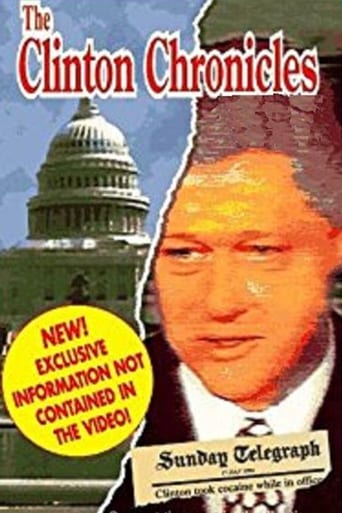
01 Jun 1994

The Clinton Chronicles
Investigations into alleged criminal activities of Arkansas former Governor President Bill Clinton. For the first time on video. A documentary that puts together the whole story!

The second and final presidential debate between President Bill Clinton and former Senate Majority Leader Bob Dole took place on Wednesday, October 16, 1996, at the Shiley Theater on the campus of University of San Diego in San Diego, California. The town hall style debate was moderated by Jim Lehrer of PBS' The NewsHour with featuring the questions asked by members of the audience.

Self

Self

Monderator

01 Jun 1994

Investigations into alleged criminal activities of Arkansas former Governor President Bill Clinton. For the first time on video. A documentary that puts together the whole story!

30 Sep 2016

The true story of Bill and Hillary Clinton's political alliance, business partnership, and unique marriage. Biographers, confidants, Democrats and Republicans discuss the political dynasty of Bill and Hillary Clinton.
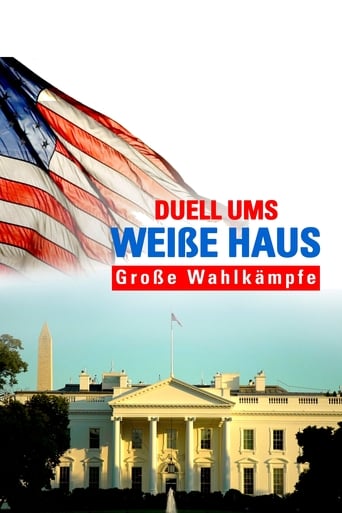
01 Nov 2016

A retrospective on the great election battles of the past in the United States: the Kennedy-Nixon debate in 1960, the first ever to be televised; the Republican campaign of 1972, which proved to be the starting point for the Watergate scandal; and the electoral strategy of Barack Obama in 2008, the first election to fully exploit the potential of the Internet.
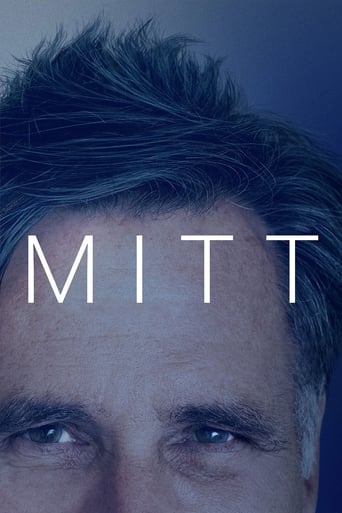
17 Jan 2014

A filmmaker is granted unprecedented access to a political candidate and his family as he runs for President.

07 Oct 2014

An intimate portrait of Matthew Shepard, the gay young man murdered in one of the most notorious hate crimes in U.S. history. Framed through a personal lens, it's the story of loss, love, and courage in the face of unspeakable tragedy.
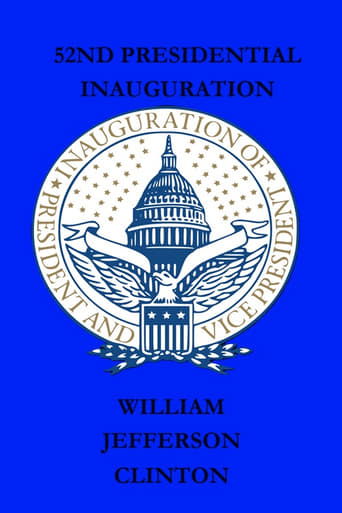
20 Jan 1993

The first inauguration of Bill Clinton as the 42nd president of the United States was held on Wednesday, January 20, 1993, at the West Front of the United States Capitol in Washington, D.C. This was the 52nd inauguration and marked the commencement of the first term of Bill Clinton as president and Al Gore as vice president.

20 Jan 1997

The second inauguration of Bill Clinton as the 42nd president of the United States was held on Monday, January 20, 1997, at the West Front of the United States Capitol Building in Washington, D.C. This was the 53rd inauguration and marked the commencement of the second and final term of Bill Clinton as president and Al Gore as vice president. This was the last presidential inauguration to take place in the 20th century.
02 Oct 2012
A look at the lives of Bill and Hillary Clinton from meeting in college to the White House.
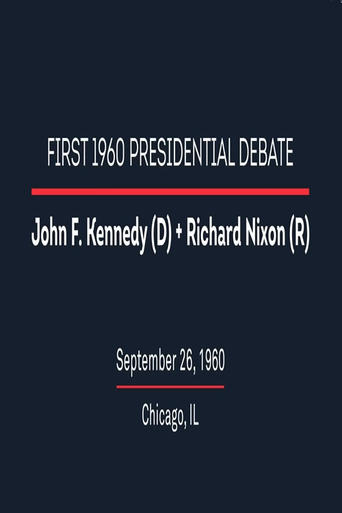
26 Sep 1960

CBS (Columbia Broadcasting System) motion picture of the first presidential debate between Senator John F. Kennedy and Vice President Richard M. Nixon from CBS studios, Chicago, Illinois. During the debate, Senator Kennedy states, "I don't believe in big government, but I believe in effective governmental action." Each candidate makes an opening statement of eight minutes and a closing statement of three minutes.

07 Oct 1960

The second presidential debate between Vice President Richard Nixon and Senator John F. Kennedy took place on Friday, October 7, 1960, at the WRC-TV studios in Washington, D.C.. Questions were related to internal American matters, foreign relations, economy, etc.

13 Oct 1960

The third presidential debate between Vice President Richard Nixon and Senator John F. Kennedy took place on Thursday, October 13, 1960, were held virtually at the ABC studios in Los Angeles, California (for Nixon) and New York City, New York (for Kennedy). The debate was moderated by Bill Shadel of ABC with Frank McGee, Charles Van Fremd, Douglass Cater and Roscoe Drummond as panelists. To ensure fairness, the journalists (who were in Los Angeles) and Nixon were placed in separate studios. All participants addressed the camera directly, with Kennedy and Nixon both situated without aides in studios that Shadel described as "identical in every detail." A major topic of the debate was whether military force should be used to prevent Quemoy and Matsu, two island archipelagos off the Chinese coast, from falling under Communist control

21 Oct 1960

The fourth and final presidential debate between Vice President Richard Nixon and Senator John F. Kennedy took place on Friday, October 21, 1960, at the ABC studios in New York City, New York. The debate was moderated by Quincy Howe of ABC with Frank Singiser, John Edwards, Walter Cronkite and John Chancellor as panelists. Questions were related to Foreign affairs.

23 Sep 1976

The first presidential debate between President Gerald Ford and former Governor Jimmy Carter took place on Thursday, September 23, 1976, in the Walnut Street Theater in Philadelphia, Pennsylvania. The debate was moderated by Edwin Newman of NBC moderated the debate with a panel consisting of Elizabeth Drew, Frank Reynolds and James Gannon posed the questions to each candidate. This was the first presidential debate in 16 years. Eighty-one minutes into the broadcast of the 90 minute debate, the sound was lost and the debate was paused for 27 minutes before the problem was fixed and the debate could resume.

06 Oct 1976

The second presidential debate between President Gerald Ford and former Governor Jimmy Carter took place on Wednesday, October 6, 1976, at the Palace of Fine Arts in San Francisco, California. The debate was moderated by Pauline Frederick of NPR, who posed the questions for each candidate. The debate is infamous for President Ford's gaffe, "There is no Soviet domination of Eastern Europe and there never will be under a Ford administration."

22 Oct 1976

The third and final presidential debate between President Gerald Ford and former Governor Jimmy Carter took place on Friday, October 22, 1976, in the Phi Beta Kappa Memorial Hall at the College of William & Mary in Williamsburg, Virginia. The debate was moderated by Barbara Walters of ABC, who posed the questions for each candidate.

15 Oct 1976

The only vice presidential debate between Senator Bob Dole and Senator Walter Mondale took place on Friday, October 15, 1976, in the Alley Theatre in Houston, Texas. It was the first vice presidential debate in American history. James Hoge of Chicago Sun-Times posed the questions for each candidate.

21 Sep 1980

The first presidential debate took place on Sunday, September 21, 1980, at the Baltimore Convention Center in Baltimore, Maryland. The three invitees were Carter, Anderson and Reagan, though Carter refused to attend due to the presence of Anderson. Following a strong performance by Reagan, Anderson's poll numbers began to drop. Consequently, Anderson would not be invited to the second debate.

28 Oct 1980

The second presidential debate took place on Tuesday, October 28, 1980, at the Music Hall in Cleveland, Ohio. Carter and Reagan were the only invitees. Reagan's most notable moments include using the phrase "There you go again" and asking whether or not Americans were better off than they were four years ago. CNN attempted to include Anderson from the Constitution Hall in Washington, D.C. CNN's Daniel Schorr read the same questions to Anderson. They then aired Anderson's live responses along with tape delay of Carter and Reagan's responses, despite technical difficulties.

07 Oct 1984

The first presidential debate between President Ronald Reagan and former Vice President Walter Mondale took place on Sunday, October 7, 1984, at the Center for the Performing Arts in Louisville, Kentucky. The debate was moderated by Barbara Walters of ABC News and featured a panel featuring James Wieghart of New York Daily News, Diane Sawyer of CBS News, and Fred Barnes of New Republic. The topics were economic and domestic policy issues. Despite trailing far behind Reagan in the polls leading up to the debate, Mondale exceeded expectations and emerged as the clear winner of the first debate.

21 Oct 1984

The second and final presidential debate between President Ronald Reagan and former Vice President Walter Mondale took place on Sunday, October 21, 1984, at the Music Hall, Municipal Auditors in Kansas City, Missouri. The debate was moderated by Edwin Newman, formerly of NBC News and featured a panel featuring Georgie Anne Geyer of Universal Press Syndicate, Marvin Kalb of NBC News, journalist Henry Trewhitt and Morton Kondracke of New Republic. The topics were defense and foreign policy issues. The debate is often seen as a victory for Reagan, most famously due to the line "I will not make age an issue of this campaign. I am not going to exploit, for political purposes, my opponent's youth and inexperience," it was received with laughter from the audience, and Mondale himself. Mondale later said that it was this moment when he realized he would lose the election.